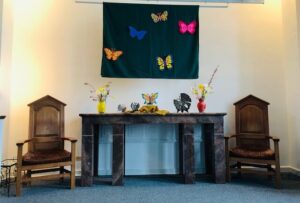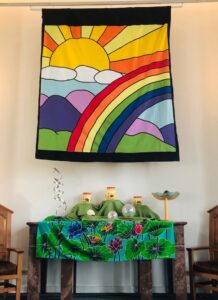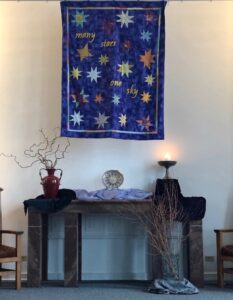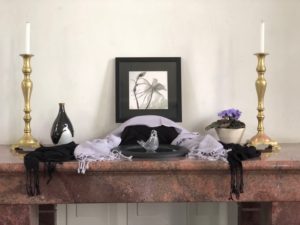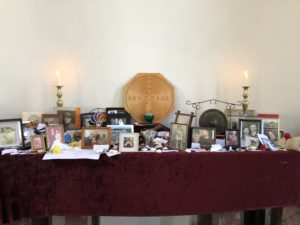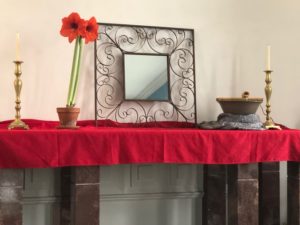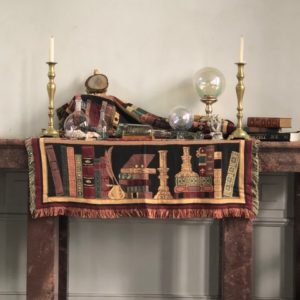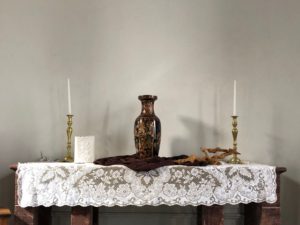Read the Order of Service
February 14, 2016 – Our senses can help us to mindfully achieve our desires, or draw us away from our goals. With Valentine’s Day upon us, how can we reconcile its cultural messages in a way that delights our senses while at the same time honoring our whole selves?
Download a pdf copy of this sermon.
—
Come to Your Senses
Sermon written for February 14, 2016
Thomas Jefferson Memorial Church Unitarian Universalist
By Rev. Alexandra McGee
This morning I would like to talk about being your whole self—no parts separated or repressed. I am going to talk about human desire— the times when it pulls it closer to who you truly are, and when it pulls you away from your center.
Today is Valentine’s Day. The national Unitarian Universalist Association sponsors a is a public advocacy campaign called Standing on the Side of Love that seeks to harness love’s power to stop oppression. For the 30 Days, from Martin Luther King Day through Valentine’s Day, they have linked with other groups nationwide to have educational events called 30 Days of Love, bringing compassion and courage to bear for immigrant justice, racial justice, and equity for lesbian, gay, bisexual, transgender and queer persons.
This is just one way of claiming Valentine’s Day.
Valentine’s Day can bring up many meanings, many images. If I were to poll this room, we might hear that people associate Valentine’s Day with romance,
with Hallmark cards,
with candy hearts,
with roses,
with construction paper and white paper doilies and glue.
We might hear that people experience Valentine’s Day as part of the patriarchal system that makes heterosexual relationships the norm in media.
We might hear that people associate Valentine’s Day with loneliness, being painfully single, with fighting the romantic myth that we can only be happy when in a partnership.
And,
We might hear that people have been claiming Valentine’s Day as a time to affirm exactly what kind of loving relationship you are in, in your own, creative way.
These mixed messages about Valentine’s Day lift up the complexity of how the sensual and the spiritual and the ethical are interconnected. And all of those are worth talking about in church.
I once heard a retired professor of spirituality from the Mennonite seminary in Harrisonburg speak. She said,
“Life is messy.
Life comes into this world with the water breaking.
Life continues with monthly cycles that involve bleeding.
Sexual intercourse involves fluids.
Life is not neat. The very essence of being creative is messy.”
Our Unitarian Universalist Association is committed to educating our youth and all ages about healthy human sexuality in a curriculum called OWL —- O. W. L. which stands for Our Whole Lives. OWL.
OWL is founded on some basic assumptions. Here they are:
– all persons are sexual
– sexuality is a good part of the human experience
– sexuality includes much more than sexual behavior
– human beings are sexual from the time they are born until they die
– it is natural to express sexual feelings in a variety of ways
– people engage in healthy sexual behavior for many reasons, including to express care and love, to experience intimacy and connection with another, to share pleasure, to bring new life into the world, and to have fun and relax
– sexuality in our society is damaged by violence, exploitation, alienation, dishonesty, abuse of power, and the treatment of persons as objects
Those are the basic assumptions in the curriculum of Our Whole Lives (OWL).
One of the classes in OWL makes a useful clarification distinguishing five areas of our sexuality:
One: Sexualization, which are the media messages and/or violence that occur in society
Second area: Intimacy, which is about the vulnerability and responsibility of being in relationship
Third area: Biological sex and gender expression
Fourth area: Sexual and reproductive health
Fifth: Sensuality, which are the ways humans have pleasure and comfort with their bodies
Sensuality is the areas that I want to talk about today. Especially when our senses cause us to have desires.
All of human history is full of examples in stories, literature, movies, poetry, of situations where two people’s desires didn’t quite line up. Even in the best of situations, it can be hard for each person to truly know what they desire, and to act on it in a time and way that lines up with another person’s desire, and that person’s ability to act on it in a time and way that is clear. So, the bad news here, as you probably know from life experience, is how often desires get us into awkward or painful situations. The good news here is that it is not the Desire itself that is a problem, — it is not the Desire itself that is a problem, —it but the human capacity to kid ourselves, be angry, be anxious, be afraid, that twists things up. So, my friends, what is holy and whole, is to know ourselves as much as possible, and to honor that as much as possible, and to bring that to another person and honor them. That is the holy journey of being a fully alive sexual person. And when things end up in confusion or pain, we have our tools of forgiveness and reconciliation to help us move onward.
So let us take an example. On the cover of your order of service is a poem. I will read it now.
This is Just to Say
By William Carlos Williams
I have eaten
The plums
That were in
the icebox
And which
You were probably
Saving
For breakfast
Forgive me
They were so delicious
So sweet
So cold
That is by William Carlos Williams, who lived in this country, born in 1885 and died in 1963.
In the poem, he states that he ate some plums. His senses of taste and touch were delighted. In fact, so delighted that he ate them, even though he thought someone else wanted them. We can presume that this someone else was someone he was close to, because they seem to share a refrigerator, and he knew this person’s breakfast plans. Furthermore, he knew that he probably needed to apologize, which is why he wrote the words, “forgive me.” One way to interpret this poem is that his beloved cares so much about his pleasure that they won’t mind not having the plums for breakfast. Another way to interpret the poem is that he acted on his desires in a way that led to a transgression.
Desires…
Acted on…
Leading to a
…a transgression.
Many decades later, in another part of the country, another poet, Erica-Lynn Gambino, wrote a response. I will read it to you now.
for William Carlos Williams, in response to This is Just to Say
I have just
asked you to
get out of my
apartment
even though
you never
thought
I would
Forgive me
you were
driving
me insane.
I share this example, because when we act on desires, we may discover that there are consequences greater than we expected. The choices we make have an effect on other people, and they respond with the boundaries they choose.
This example is about the sense of taste and touch. It can lead us to a wider inquiry of all our of senses.
If I were to ask you what the five senses are, what would you say?
Feel free to indicate with me…
Seeing
Hearing
Tasting
Smelling
Touching
These help us perceive the world….taking the external and making it an internal experience. Isn’t that what happens when you smell a flower? When you taste food? When warm water flows on your skin? When hear a song? When you see the sky? We are changed by those sensory experiences. Now, I acknowledge that I speak in general terms here— I am well aware that not all of us have five senses, and that our senses increase and decrease at different times in our lives, and sometimes medical conditions cause us to adapt the ways that we savor life.
I like to turn to ancient Indian philosophy for insight, and Ancient Indian philosophy has extensive discussion of these senses, and says we need to be able to identify our senses because we humans have a propensity to let our senses run us, instead of using them in service of what we know is healthy. In other words, our desires get the better of us. So, a spiritual life is about learning to really see what is going on. Watching ourselves with enough mindfulness to see when we are acting from a desire that over-indulges our senses at a great cost, and distinguish that from when we are acting from a desire that is about a higher good. For example, again, the plums in the poem above. Another example is eating a sweet food, and then going beyond a simple pleasure into over consumption that has health costs. Another example is when we enjoy the touch of another person, but are not in a relationship in which that touch is healthy. In all these cases, the sense pleasure is not bad, but if we act without looking at the outcome, it might lead us to cause harm to ourselves or others.
But what can we do about it?
Many religious traditions around the world have spiritual practices in which a person takes time out from daily activity —take a break from walking, talking, working, playing, … all those ways we use our senses to navigate the world. During this quiet retreat time, they withdraw their senses, in the same way that you might withdraw your hand from a glove. Look at them. During this kind of spiritual practice, a person can reconnect to the place inside which is the even keel, the clear guide, where desires can be filtered for the highest good.
For you, that kind of spiritual retreat might be ten minutes on a meditation cushion in your bedroom, or the relaxation time at the end of yoga class, or sitting quietly with your morning coffee, or a “power nap,” or whatever way you find stillness. I’m talking about a state of calmness in which our minds settle down and our internal physiology changes.
After a time of stillness and withdrawing the senses, a chemical change occurs in our brain, and hence new options open for our Soul, because there is no longer cluttering thoughts and desires clogging the channel between our conscience and our actions:
Then, as you move back out into the world, into relationship, into taste, into speech, into listening, you can do so from the guidance of your heart, and pure desire. This is good news my friends.
Being your whole self—no parts separated or repressed. This is when your desires pull you closer to who you truly are.
I will close with a suggestion. Perhaps the poem could be re-written like this:
This is Just to Say
I saw
the plums
that were in
the icebox
So red
So ripe
And I wanted
To eat them.
I did not.
I knew
That you
Would enjoy them.
I ate one.
I left one for you.
Thank you.
Enjoy.
My friends. We have choices—that moment after we sense something, and before we act. What is truly good for our relationships and the people around us?



